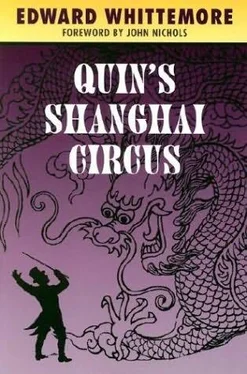Edward Whittemore - Quin’s Shanghai Circus
Здесь есть возможность читать онлайн «Edward Whittemore - Quin’s Shanghai Circus» весь текст электронной книги совершенно бесплатно (целиком полную версию без сокращений). В некоторых случаях можно слушать аудио, скачать через торрент в формате fb2 и присутствует краткое содержание. Жанр: Фэнтези, на английском языке. Описание произведения, (предисловие) а так же отзывы посетителей доступны на портале библиотеки ЛибКат.
- Название:Quin’s Shanghai Circus
- Автор:
- Жанр:
- Год:неизвестен
- ISBN:нет данных
- Рейтинг книги:3 / 5. Голосов: 1
-
Избранное:Добавить в избранное
- Отзывы:
-
Ваша оценка:
- 60
- 1
- 2
- 3
- 4
- 5
Quin’s Shanghai Circus: краткое содержание, описание и аннотация
Предлагаем к чтению аннотацию, описание, краткое содержание или предисловие (зависит от того, что написал сам автор книги «Quin’s Shanghai Circus»). Если вы не нашли необходимую информацию о книге — напишите в комментариях, мы постараемся отыскать её.
Quin’s Shanghai Circus — читать онлайн бесплатно полную книгу (весь текст) целиком
Ниже представлен текст книги, разбитый по страницам. Система сохранения места последней прочитанной страницы, позволяет с удобством читать онлайн бесплатно книгу «Quin’s Shanghai Circus», без необходимости каждый раз заново искать на чём Вы остановились. Поставьте закладку, и сможете в любой момент перейти на страницу, на которой закончили чтение.
Интервал:
Закладка:
And maybe you’ll help me speak to her?
Sure.
Just like that?
Just like that.
Big Gobi jumped into the air. He yelled, he danced, he spun up and down the beach collecting driftwood from Chinese rivers and Manchurian forests, dancing down a beach on the edge of Asia finding wood for a bonfire in the sun.
Hey, he shouted. Hey hey hey.
Women hey .
Oysters hey .
Hey hey hey.
Late that night, his lips torn and his neck scratched, his back bearing scars, Big Gobi staggered into a train bound for Tokyo, a veteran of the campaigns on the Yokohama waterfront, that narrow strip of land where hordes of invading sailors streamed ashore every night to do battle with a handful of brave whores.
The ferocious adventurers came from every corner of the world. There were Burmans and Chadians and Quechuas and Lapps and Georgians swearing in a hundred tongues and brandishing a thousand varied weapons, every conceivable kind of knife and pick and sword and bludgeon and pike. Between them they were missing every part of the human body. They had warts in every combination supplemented by a multitude of tattoos and moles, birthmarks, miscellaneous discolorings, and wounds both old and new, generally treated but often only recently scabbed. They were a desperate army with only one goal, a night of unlimited plunder after weeks at sea.
Darkness fell, the late sunset of a summer night. Children waved good-bye to the pretty ships in the harbor, crowds moved from the department stores to the movie theaters. Strollers ate cold noodles. It was a peaceful evening in downtown Yokohama with a cooling breeze off the bay.
And yet no more than two miles away the battle was ready to begin. Some fifty or sixty Japanese heroines were preparing to defend the homeland against the combined navies of the world.
The gangplanks came down, the launches sped back and forth. The first wave of barbarians swarmed into pawnshops snatching up cameras and silk jackets, raced down the streets through the whining music, climbed over the crashing chairs, and hurtled the bottles shattering in the alleys. The massed squadrons pushed forward, regrouped, mounted another assault. Heads cracked on the pavement, bellies spilled out in doorways. The sailors fought on their backs and rolled over to strike again from the side, from above, from below, in between, in back, knee level, naval level, chest level, eye level, from the rooftops and the tops of chairs and toilet bowls.
But gradually their ranks thinned, their bodies piled up on the docks and jetties. A few snipers still carried on in upstairs windows, but long before sunrise the outcome of the battle was decided.
Here and there a whore lay temporarily unconscious, but most were walking home on their own sturdy legs, limping perhaps, certainly exhausted, but with their sea chests bulging with money from around the world. Behind them they left carnage and ruin, snoring carcasses from a hundred distant ports, the broken lust of foreigners. Once again a handful of heroines had won total victory in the nightly Yokohama battle, and all over Japan innocent women and children were able to sleep safely because of it.
Big Gobi sat in the train with his eyes closed. When he had first left the princess in the palace, he had felt as if he had no bones, then for a while he had lost his legs and been an amputee. Now the numbness was gone and he was suffering the torture of a thousand cuts. Oriental torture. Time.
He smiled.
Did you see how she walked right up to me, Quin? She never backed away at all. On the freighter they used to say I smelled of seagull droppings, but she didn’t say anything like that. She just took me by the hand and then when we were in the room she let me turn on the television set so we could watch it from the bed. Imagine just doing it and watching television at the same time. You know tomorrow I think I’ll just stay home and relax and watch television. She said she watches all the time, so I think I’ll just sit around tomorrow and think about it. She must have been about sixteen and that was the first night she’d worked there and I was the first one, you know, she’d ever done anything with. Her parents are poor and she doesn’t want her little brother to go to an orphanage and that’s why she’s there. She said I understood a lot about people considering I don’t even speak Japanese, the people we were watching I mean, the people on television. She said I could come again and watch television, or watch her while she was watching television, or watch them while they were watching us. Just us, the two of us I mean, and all the others. I mean I’ve never been with a person like that where there were just the two of us, two of us alone but me not alone at all because she was there. Never. Not since I was born.
Big Gobi smiled as he fell asleep.
Quin looked out the window at the lights flashing by. He was thinking of Geraty then, wondering as always how much of the giant’s tale he could believe, not realizing that at that very moment he was returning from the site of the famous picnic on the beach south of Tokyo where Maeve Quin had long ago laid out a blanket for three men in gas masks, her husband and Father Lamereaux and the elderly Adzhar, the wandering Russian linguist whose cross Big Gobi now wore, thereby setting in motion an espionage game that was to last eight years, culminating in Big Gobi’s conception in a warehouse on the outskirts of Shanghai on the eve of a doomed circus performance.
Father Lamereaux
I had to sneak back and forth through the city, evaporate and materialize, die in doorways and resurrect myself in the moonlight of the cemetery.
There seemed to be only one thing to do, so I did it. I became a ghost.
Father Lamereaux peered down the corridor. The kitchen door was closed, a mop slapped the floor. He tiptoed out of his study. Just before he reached the garden door the mop stopped.
Master?
He held his breath. The voice spoke again from the blank wood of the kitchen door.
It’s raining, master. Use the toilet.
Father Lamereaux sighed. A little summer drizzle never hurt anyone. Besides, he had intended to go only as far as his favorite patch of moss beside the garden wall.
He left the toilet and sank into the chair behind his desk. Japanese urinals were the worst-smelling in the world, everyone knew that. They were so bad Japanese men never used them, which was a sound custom, practical as well as wise. It kept little boys from associating their tassels with dark, smelly places. In the West a boy had to hide in a closet, lock himself in. No wonder he grew up thinking his body and the demands of his body were impure.
Yet at the same time the little Western boy was enjoying himself, he had no choice. Eliminating waste was always enjoyable.
Guilt.
While in Japan, on the other hand, a boy was encouraged from the beginning to do his business out-of-doors. In public. His mother spread him over the gutter when he was a baby. Later, on the train, his older sister urged him to use an empty bottle rather than bother people by pushing up the aisle. Or if there wasn’t an empty bottle, she showed him how to stand on the seat and direct his aim downwind.
Women admired him. A natural act naturally performed. A world of sun and rain and men and flowers living together in harmony.
After fifty years in Japan a man couldn’t piss in his own garden?
Fifty years, half a century. A life that spanned three-quarters of a century. Nearly one-quarter of a century without a drink.
Father Lamereaux liked to think in terms of centuries, epochs, dynasties. When he first came to Japan it had helped him understand these people. Now it helped him understand himself.
Читать дальшеИнтервал:
Закладка:
Похожие книги на «Quin’s Shanghai Circus»
Представляем Вашему вниманию похожие книги на «Quin’s Shanghai Circus» списком для выбора. Мы отобрали схожую по названию и смыслу литературу в надежде предоставить читателям больше вариантов отыскать новые, интересные, ещё непрочитанные произведения.
Обсуждение, отзывы о книге «Quin’s Shanghai Circus» и просто собственные мнения читателей. Оставьте ваши комментарии, напишите, что Вы думаете о произведении, его смысле или главных героях. Укажите что конкретно понравилось, а что нет, и почему Вы так считаете.












